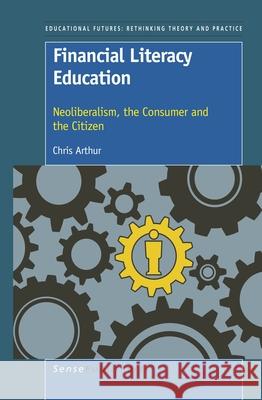Financial Literacy Education : Neoliberalism, the Consumer and the Citizen » książka
Financial Literacy Education : Neoliberalism, the Consumer and the Citizen
ISBN-13: 9789460919176 / Angielski / Twarda / 2012 / 158 str.
Financial Literacy Education : Neoliberalism, the Consumer and the Citizen
ISBN-13: 9789460919176 / Angielski / Twarda / 2012 / 158 str.
(netto: 420,89 VAT: 5%)
Najniższa cena z 30 dni: 425,63
ok. 30 dni roboczych.
Darmowa dostawa!
Consumer fi nancial literacy education often appears as a helpful, commonsense solution to neoliberalism and the individualization of responsibility for economic risk. However, in Financial Literacy Education: Neoliberalism, the Consumer and the Citizen this particular literacy is argued to be both ineffective and unjust. Socially created poverty, unemployment and economic insecurity require more than individual consumer solutions; they require collective responses by engaged, critical citizens. Utilizing concepts from Marx, Foucault, Bourdieu and Baudrillard this book challenges those who claim that 'there is no alternative' to neoliberal insecurity and reduce education to a consumerist training of entrepreneurial consumer-citizens who can continually invest in themselves and the market. Through an analysis of consumer fi nancial literacy education's present and historical supports, as well as its likely effects, this book argues that the choice before us is not fi nancial illiteracy or fi nancial literacy. Rather, the choice is between subjugation to the requirements of perpetual competition or overcoming alienation, insecurity and exploitation, aims the critical fi nancial literacy education outlined at the end of this book supports. This book will appeal to those interested in understanding the conditions of our freedom in an increasingly fi nancialized world - critical educators, philosophers and sociologists of education and fi nancial literacy researchers.
Consumer fi nancial literacy education often appears as a helpful, commonsensesolution to neoliberalism and the individualization of responsibility for economic risk.However, in Financial Literacy Education: Neoliberalism, the Consumer and the Citizenthis particular literacy is argued to be both ineffective and unjust. Socially createdpoverty, unemployment and economic insecurity require more than individual consumersolutions; they require collective responses by engaged, critical citizens. Utilizingconcepts from Marx, Foucault, Bourdieu and Baudrillard this book challenges thosewho claim that there is no alternative to neoliberal insecurity and reduce educationto a consumerist training of entrepreneurial consumer-citizens who can continuallyinvest in themselves and the market. Through an analysis of consumer fi nancial literacyeducations present and historical supports, as well as its likely effects, this bookargues that the choice before us is not fi nancial illiteracy or fi nancial literacy. Rather,the choice is between subjugation to the requirements of perpetual competitionor overcoming alienation, insecurity and exploitation, aims the critical fi nancialliteracy education outlined at the end of this book supports. This book will appealto those interested in understanding the conditions of our freedom in an increasinglyfi nancialized world - critical educators, philosophers and sociologists of education andfi nancial literacy researchers.











